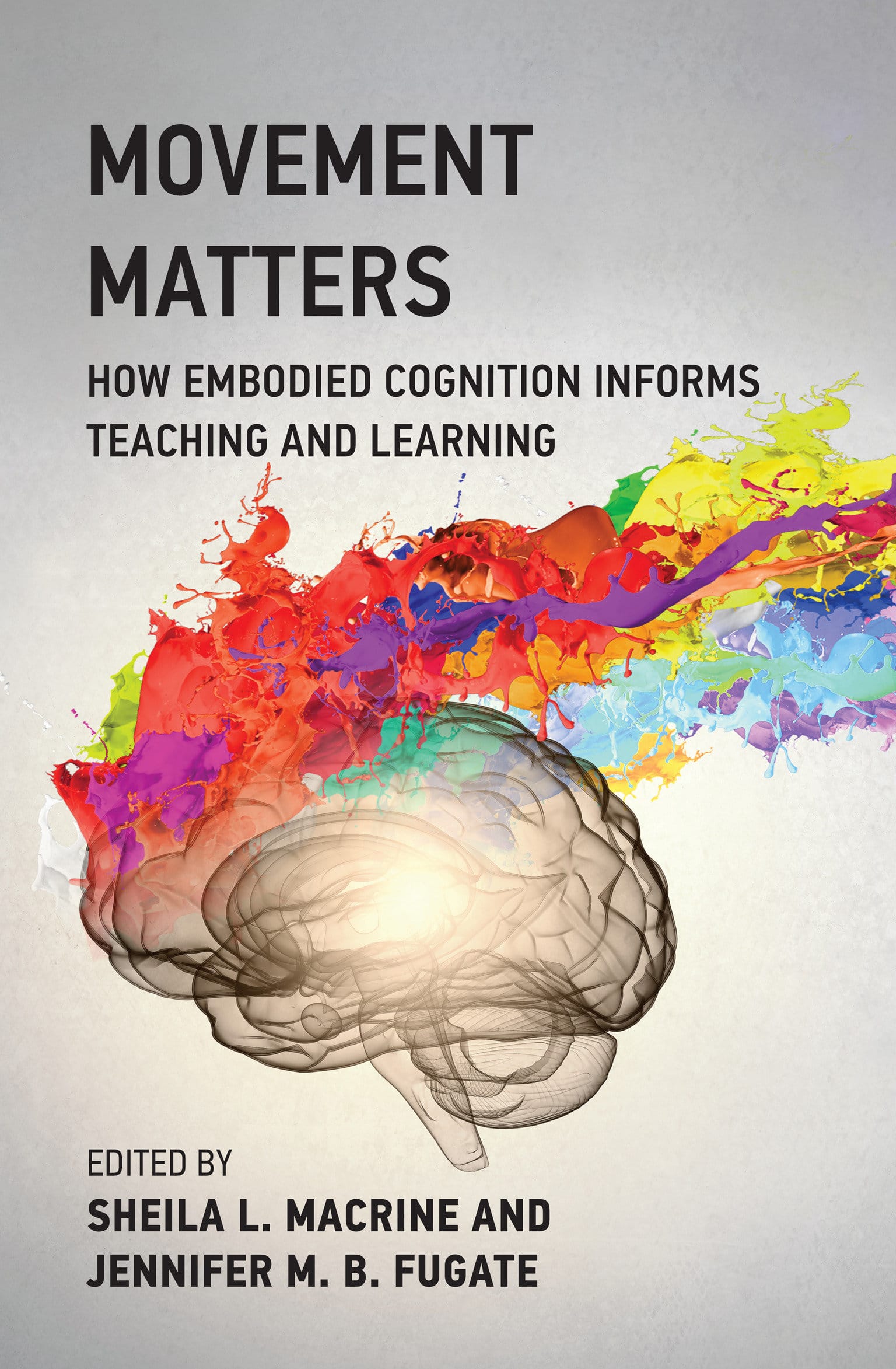Movement Matters: How Embodied Cognition Informs Teaching and Learning
51.00 JOD
Please allow 2 – 5 weeks for delivery of this item
Description
Experts translate the latest findings on embodied cognition from neuroscience, psychology, and cognitive science to inform teaching and learning pedagogy.Embodied cognition represents a radical shift in conceptualizing cognitive processes, in which cognition develops through mind-body environmental interaction. If this supposition is correct, then the conventional style of instruction—in which students sit at desks, passively receiving information—needs rethinking. Movement Matters considers the educational implications of an embodied account of cognition, describing the latest research applications from neuroscience, psychology, and cognitive science and demonstrating their relevance for teaching and learning pedagogy. The contributors cover a range of content areas, explaining how the principles of embodied cognition can be applied in classroom settings. After a discussion of the philosophical and theoretical underpinnings of embodied cognition, contributors describe its applications in language, including the areas of handwriting, vocabulary, language development, and reading comprehension; STEM areas, emphasizing finger counting and the importance of hand and body gestures in understanding physical forces; and digital learning technologies, including games and augmented reality. Finally, they explore embodied learning in the social-emotional realm, including how emotional granularity, empathy, and mindfulness benefit classroom learning. Movement Matters introduces a new model, translational learning sciences research, for interpreting and disseminating the latest empirical findings in the burgeoning field of embodied cognition. The book provides an up-to-date, inclusive, and essential resource for those involved in educational planning, design, and pedagogical approaches. ContributorsDor Abrahamson, Martha W. Alibali, Petra A. Arndt, Lisa Aziz-Zadeh, Jo Boaler, Christiana Butera, Rachel S. Y. Chen,Charles P. Davis, Andrea Marquardt Donovan, Inge-Marie Eigsti, Virginia J. Flood, Jennifer M. B. Fugate, Arthur M. Glenberg, Ligia E. Gómez, Daniel D. Hutto, Karin H. James, Mina C. Johnson-Glenberg, Michael P. Kaschak, Markus Kiefer, Christina Krause, Sheila L. Macrine, Anne Mangen, Carmen Mayer, Amanda L. McGraw, Colleen Megowan-Romanowicz, Mitchell J. Nathan, Antti Pirhonen, Kelsey E. Schenck, Lawrence Shapiro, Anna Shvarts, Yue-Ting Siu,Sofia Tancredi, Chrystian Vieyra, Rebecca Vieyra, Candace Walkington, Christine Wilson-Mendenhall, Eiling Yee
Additional information
| Weight | 0.57 kg |
|---|---|
| Dimensions | 2.16 × 16.01 × 22.86 cm |
| PubliCanadanadation City/Country | USA |
| by | |
| Format | Paperback |
| Language | |
| Pages | 350 |
| Publisher | |
| Year Published | 2022-4-19 |
| Imprint | |
| ISBN 10 | 0262543486 |
| About The Author | Sheila L. Macrine is Professor in the Department of STEM Education and Teacher Development at the University of Massachusetts Dartmouth. Jennifer M. B. Fugate is Associate Professor in the Department of Health Service Psychology at Kansas City University. |
| Other text | “How intimate are the links between mind, body, and movement? In this important and groundbreaking volume, research on the embodied mind suggests exciting new perspectives on teaching and learning. Essential reading for all those interested in evidence-led approaches to education.” —Andy Clark, Professor of Cognitive Philosophy, University of Sussex; author of Being There and Surfing Uncertainty “Movement Matters cashes out principles related to embodiment, grounding, and situated action that have been percolating in cognitive science for decades. Contributions to this volume develop these principles in real-world practices associated with teaching and learning, demonstrating the promise of translational learning science. New understandings, approaches, and tools related to education result. A must-read for innovators aiming to strengthen educational institutions and their practices.” —Lawrence W. Barsalou, Professor of Psychology, University of Glasgow “Movement matters. Indeed, it does! And as this volume clearly demonstrates, it matters in educational contexts. This is the most comprehensive collection yet that addresses the link between embodied cognition (the 4Es) and education (a fifth E). I give it an A+ and recommend it to all educators and education theorists.”—Shaun Gallagher, Lillian and Morrie Moss Chair of Excellence, University of Memphis; Professorial Fellow, SOLA, University of Wollongong “Macrine and Fugate have brought together an extraordinary team of experts on embodied cognition for this groundbreaking volume in the best tradition of translational science. If you are interested in what modern cognitive science has to say about learning and knowing in a wide range of educational settings, you will find a wealth of intriguing and surprising ideas in these chapters. The volume presents a sophisticated view of embodied cognition, but also strongly emphasizes its potential applications for educators.” —James A. Dixon, Professor, Department of Psychological Sciences, and Director, Center for the Ecological Study of Perception and Action, at the University of Connecticut, Storrs |
| Table Of Content | Acknowledgments xiForeword xiiiIntroduction 1I PHILOSOPHICAL AND THEORETICAL BACKGROUND1 Embodied Cognition and Its Educational Significance 132 Embodied Concepts: Basic Mechanisms and Their Implications for Learning and Memory 253 Embodied, Enactive Education: Conservative versus Radical Approaches 39II LANGUAGE4 The Embodiment of Letter Perception: The Importance of Handwriting in Early Childhood 555 Embodied Classroom Activities for Vocabulary Acquisition 776 Educational Applications of Enacted, Embodied Approaches to Language Comprehension 917 Reading, Writing, Technology, and Embodiment 103III STEM8 Seeing Is Achieving: The Importance of Fingers, Touch, and Visual Thinking to Mathematics Learners 1219 Groups That Move Together, Prove Together: Collaborative Gestures and Gesture Attitudes among Teachers Performing Embodied Geometry 13110 Manipulatives and Mathematics Learning: The Roles of Perceptual and Interactive Features 14711 Physics and Gesture: Spatial Thinking and Mutual Manifestness 163IV APPLIED TECHNOLOGY12 Responsive Teaching for Embodied Learning with Technology 17913 The Need for SpEED: Reimagining Accessibility through Special Education Embodied Design 19714 Immersive Learning Experiences in Augmented Reality (AR): Visualizing and Interacting with Magnetic Fields 21715 Evaluating Embodied Immersive STEM VR Using the Quality of Education in Virtual Reality Rubric (QUIVRR) 237V SOCIAL COGNITION, EMOTION, MINDFULNESS 16 Mirror Neurons and Social Implications for the Classroom 26117 Beyond the Social Domain: Autism Spectrum Traits and the Embodiment of Manipulable Object Concepts 27518 Embodied Emotion, Emotional Granularity, and Mindfulness: Improved Learning in the Classroom 291Conclusion 307Resources 317Contributors 323Index 327 |
Only logged in customers who have purchased this product may leave a review.






Reviews
There are no reviews yet.